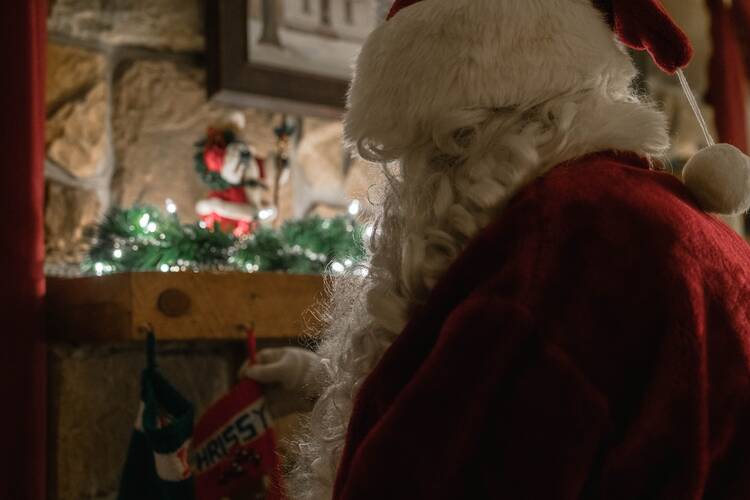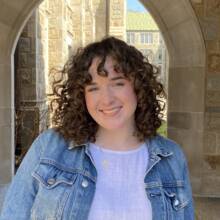A Reflection for the Memorial of St. John of the Cross, Priest and Doctor of the Church
“And if you are willing to accept it,
he is Elijah, the one who is to come.
Whoever has ears ought to hear.”
You can find today’s readings here.
I was in the third grade, climbing the stairs of the jungle gym when another girl called out to me, “Laney, guess what I learned?” She stood firmly on the woodchips, sporting a devilish grin, looking up at me from between the metal guardrails on the play structure.
“What?” I asked, leaning over the edge.
“Santa isn’t real. I asked and my mommy told me. It’s just the parents.” (My apologies to any 9-year-old America readers if I am the one to break this news.)
“I don’t believe you,” I told her obstinately, lifting my chin high so that she couldn’t see my face from down below. “You know, you really shouldn’t say that. Santa won’t come if you don’t believe.”
In reality, I was spiraling. It couldn’t be true, could it? Santa always wrote in a neat capital print that didn’t look like either of my parent’s handwriting. Plus, every Christmas Eve we always checked the NORAD Santa tracker, which claimed to use U.S. military radar to track Santa’s location—the government wouldn’t lie, would they?
I resolved to ask my mom once I got home, but as soon as I stepped in the door of our little blue house, something stopped me. I don’t remember what it was: Maybe it was my 6-month-old brother crying; maybe I was worried it would make my mom sad if I asked. So I carried on that Advent season looking for tiny clues that would prove Santa was real.
We hold so fast to our conceptions of how things ought to be (especially the big things, like Christmas and the Kingdom of God) that we lose sight of God’s mysterious plan, unfolding all around us.
And after a few weeks of inconclusive investigation, my sister and I were barreling down the stairs on Christmas morning. I checked the gifts from Santa—still signed with that neat capital print, not quite my mom’s or my dad’s. We tore into them and delighted, tossing wrapping paper at our feet for our dad to clean and holding up boxes to pose for photos. It was magical.
We then hurried to the kitchen to assess the damage Santa had done to the cookies we’d left. “Lane, he left a note, why don’t you read it?” My mom asked, handing me the paper. It was a short note, thanking us for the cookies and our good behavior, signed “Love, Santa”—written in my dad’s loopy, just-barely-legible print.
Mystery solved.
I didn’t tell my parents that I knew, and for a few years, I played along. (The Santa charade officially ended in sixth grade, when I suggested that perhaps Santa could bring a particularly expensive item on my list and my mom replied, “Come on Laney, cut the crap, I know you don’t believe that.”) I don’t know for how long they believed me in the interim, but I know that Christmas didn’t feel quite the same—without the mystery, all the preparation seemed to lose its magic.
Today’s Gospel is not about Santa Claus. However, as Jesus tells the crowd about John the Baptist, we see Jesus explain that John ushers in the Kingdom of God for the rest of us: “Among those born of women no one has arisen greater than John the Baptist, yet the least in the kingdom of heaven is greater than he.” Because of John, who prepares the way, we all witness the Kingdom’s arrival in Christ. John is Elijah, whom the prophecies declared would be sent “before the great and terrible day” of the Lord (Mal 3:23). Jesus says that explicitly here, with the important caveat: “If you are willing to accept it.”
John was sent to prepare the way of Jesus, and what does he tell people? “Repent, for the kingdom of heaven is at hand!” (Mt 3:2). And here, we see why many were not willing to accept it: It’s not what most of us want to be told.
I look back to that 9-year-old version of myself, and I want to tell her that there was so much magic left to see: reading in the pews next to my dad while we held our family’s spot at Christmas Eve Mass, the way my grandparents’ house smelled of cinnamon and clove when we arrived after church, my grandfather’s gruff voice reading ‘Twas The Night Before Christmas just before I fell asleep. But it wasn’t what I would have wanted to hear—I was a kid, and I wanted the magic of Christmas to be ushered in with a mountain of presents from a magical man from the North Pole.
We hold so fast to our conceptions of how things ought to be (especially the big things, like Christmas and the Kingdom of God) that we lose sight of God’s mysterious plan, unfolding all around us. Christ has tasked us to prepare one another and all announce the coming of the Lord through our lives. Advent reminds us to listen closely for these small prophecies in our daily lives and to be willing to accept them: “Whoever has ears ought to hear.”








